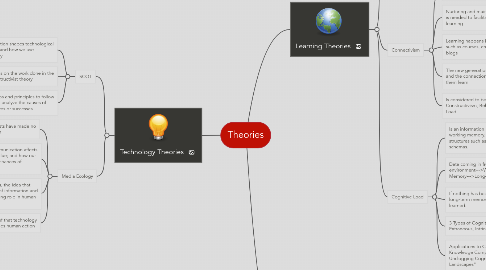
1. Technology Theories
1.1. SCOT
1.1.1. Human action shapes technological advances and how we use technology
1.1.2. Draws on the work done in the Constructivist theory
1.1.3. Formalizes the steps and principles to follow when one wants to analyze the causes of technological failures or successes
1.2. Media Ecology
1.2.1. Media Ecologists have made no single defintion
1.2.2. Media Ecology is the study of how media of communication affects human perception, understanding, feeling and value; and how our interaction with media facilitates or impedes our chances of survival
1.2.3. It is the study of media environments, the idea that technology and techniques, modes of information and codes of communication play a leading role in human affairs
1.2.4. The belief that technology determines human action
2. Learning Theories
2.1. Constructivist
2.1.1. The central idea of constructivism is that human learning is constructed, that learners build new knowledge upon the foundation of previous learning.
2.1.2. Learners come to learning situations with knowledge gained from previous experience; prior knowledge influences what new or modified knowledge they will construct.
2.1.3. Learners confront their understandings when they encounter a new learning situation
2.1.4. Constructivism approach to learning emphasizes authentic, challenging projects that include students, teachers and experts in the learning community
2.1.5. Learners can become responsible for their own learning in an authentic environment
2.1.6. Collaborative and Individual perspectives and ideas are brought to work
2.2. Connectivism
2.2.1. Learning and knowledge rests in diversity of opinions
2.2.2. Nurturing and maintaining connections is needed to facilitate continual learning
2.2.3. Learning happens in many different ways such as courses, emails, conversations and blogs
2.2.4. The new generation is technologically orientated and the connections nurture students and help them learn
2.2.5. Is considered to be a product of Constructivism, Behaviorism and the Cognitive Load
2.3. Cognitive Load
2.3.1. Is an information processing theory used to explain the limits of working memory. Refers to the concept of our minds having structures such as working memory, long term memory, and schemas.
2.3.2. Data coming in from environment--->Working Memory--->Long-term Memory<---
2.3.3. If nothing has been altered in long-term memory nothing has been learned.
2.3.4. 3 Types of Cognitive Load: Extraneous, Intrinsic and Germane
2.3.5. Applications to CLT to Instructional Design: Knowledge Compression (chunking); Repitition x 3; Unclogging Cognitive Traffic Jams with "Information Landscapes"
3. Frameworks
3.1. TPAC
3.1.1. Three primary forms of knowledge: Content (CK), Pedagogy (PK), and Technology (TK)
3.1.2. Four other forms of knowledge bases: Pedagogical Content Knowledge (PCK); Technological Content Knowledge (TCK); Technological Pedagogical Knowledge (TPK); Technological Pedagogical Content Knowledge (TPACK)
3.1.3. Many factors ensure that every situation is unique
3.1.4. No single combination of content, technology, and pedagogy will apply for every teacher, every course, or every view of teaching.
3.2. Philosophy of Teachnology
3.2.1. allows a teacher to express their personal views of how technology can be useful in a classroom.
3.2.2. similar to a philosophy of teaching but specifically targets the use of technology in teaching
3.2.3. educators develop them by asking questions such as how can technology be used as a teaching tool
